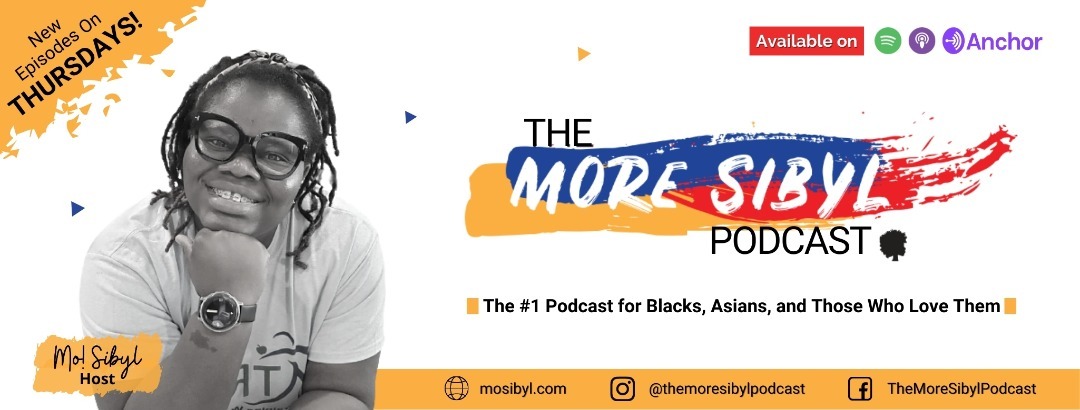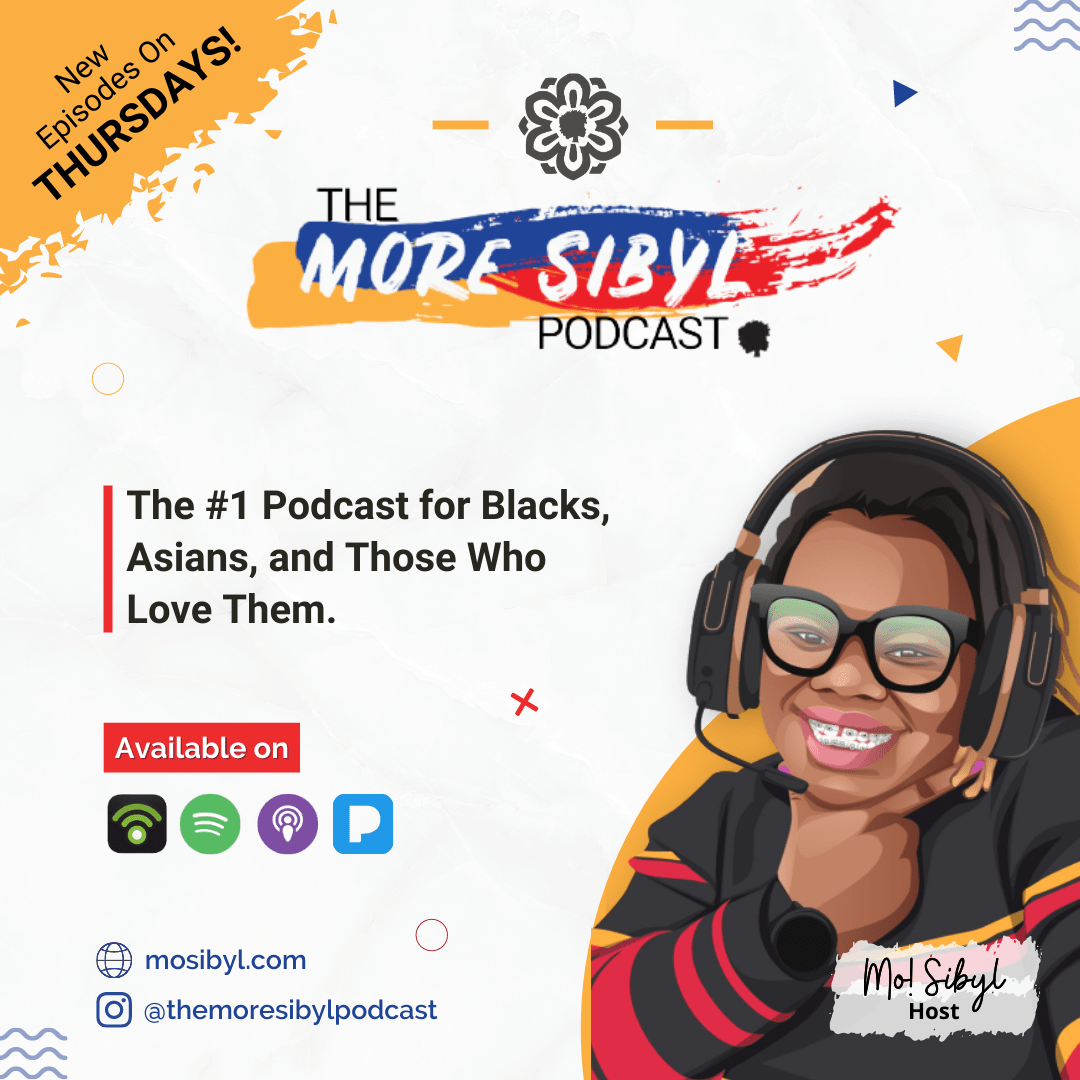
9K
Downloads
311
Episodes
The More Sibyl Podcast is hosted by Mo! Sibyl - a Nigerian-born, US-educated, Korean-speaking, Struggling Intellectual. The More Sibyl Podcast is a podcast about culture and culture nomads designed for Blacks and Asians and those who love them. On The More Sibyl Podcast, Mo! talks mostly with an invited guest, who she is inspired by, on a variety of issues, related to cultural experiences or other lived experiences related to third culture. If your concept of home is fluid, you feel like you are neither here nor there, or you consider yourself a cultural hybrid, then this podcast is for you. Support this podcast: https://anchor.fm/mosibyl/support
The More Sibyl Podcast is hosted by Mo! Sibyl - a Nigerian-born, US-educated, Korean-speaking, Struggling Intellectual. The More Sibyl Podcast is a podcast about culture and culture nomads designed for Blacks and Asians and those who love them. On The More Sibyl Podcast, Mo! talks mostly with an invited guest, who she is inspired by, on a variety of issues, related to cultural experiences or other lived experiences related to third culture. If your concept of home is fluid, you feel like you are neither here nor there, or you consider yourself a cultural hybrid, then this podcast is for you. Support this podcast: https://anchor.fm/mosibyl/support
Episodes
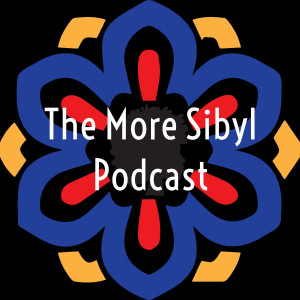
Monday Mar 04, 2019
Monday Mar 04, 2019
Dear Mosiblings!
So, I am not officially back from my creative break. However, as a matter of urgency, here’s a public service announcement to my fellow Nigerians (especially those in the diaspora) about renewing their Nigerian passports through those Passport Intervention exercises.
It’s about time for me to renew mine and if there’s anything the last two renewals taught me, it’s that it’s a stress-inducing expedition coupled with perhaps, the worst customer service experience I have ever had. I did not want to make the trip to any of the Nigerian embassies in Atlanta, DC, or New York (partly to save time and money), so I searched Google for nearby Passport Intervention activities. What I stumbled upon was startling, to say the least, especially an article written by today’s guest – Prof. Umez (umez@umez.com) - on what he uncovered. There are several reports and eyewitness accounts of extortion and corruption by those entrusted to provide this public service to Nigerians. Prof. Umez is the president of the Nigerian Foundation in Houston, Texas and the Founder of the Nigerian Leadership Council in the United States.
In a few days’ time, the Consulate General of Nigeria based in Atlanta will be holding a Passport Intervention in Houston, Texas (see link below for more details). This episode highlights the ban and warning already in place to prevent innocent Nigerians from paying additional charges for this services.
Please share this with every Nigerian you know.
Thanks!
PS: In other news, the Federal Government of Nigeria has launched a new passport scheme that’s damage-proof and weather-friendly with a 10-year validity!
Notable Quotes:
“The true deterrent to crime is not the severity but certainty of punishment.”
Recommended Songs:
“Nigeria Go Survive” – Veno (1985)
Links:
- Passport Intervention Exercise in Houston this coming weekend: http://nigeria-consulate-atl.org/
- Article referenced in the episode: http://umez.com/Ongoing-Passport-Intervention-in-Houston-and-Dallas.html
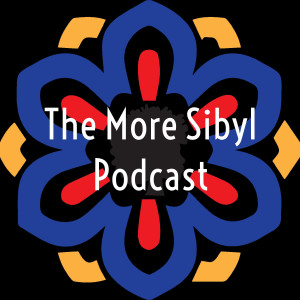
Sunday Dec 30, 2018
Bonus Episode: 브라보, 내 인생| The One with Mo! – Motherhood, Interrupted (2018)
Sunday Dec 30, 2018
Sunday Dec 30, 2018
The More Sibyl Podcast Presents: The One with The Villagers
“It takes a village to raise a child; it also takes a village to help when you have lost a child.” – Mo!
Here you will hear some voice notes from the Villagers - some of those who have been supportive in this journey of miscarriage and pregnancy loss.
I reached out to some of them to leave me voice notes and voicemails. My hope is that some of their words might be encouraging to you too in your own journey.
Resurgam (we rise together),
Mo!
--- Support this podcast: https://anchor.fm/mosibyl/support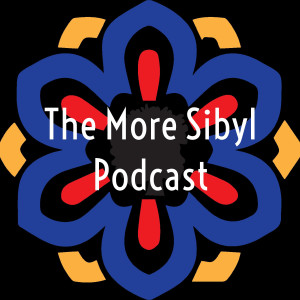
Sunday Dec 30, 2018
브라보, 내 인생| The One with Mo! – Motherhood, Interrupted: Episode 45 (2018)
Sunday Dec 30, 2018
Sunday Dec 30, 2018
Of all the things we experience as women, there are some stories that remain hidden. And even when you do get to hear these stories, they are often told from the standpoint of someone who has weathered a forgotten storm.
Here’s a story that defies all of that.
In this episode, I had a heartfelt conversation on a recent pregnancy loss with a fellow sister. Mine ended in an early-stage miscarriage in October and hers, a still-birth at 31 weeks, in November. Culture says we are not supposed to tell you this story. But here we are telling it, anyhow.
Please note that I’m not sharing this story because I expect people to care about how all of this affects me. But because it’s comforting knowing that I am not alone. Maybe some of you who listen to this episode will see your story here. If not, I hope you at least find insight into something that happens all of the time, but only few talk about. After all, this affects one in four women.
Recommended Songs:
Background: “Penelope’s Song” – Loreena McKennitt (2007)
Outro: “Let It Be” - The Beatles (Matt Hylom acoustic cover) (2014)
I see you, Sis:
Mo!
--- Support this podcast: https://anchor.fm/mosibyl/support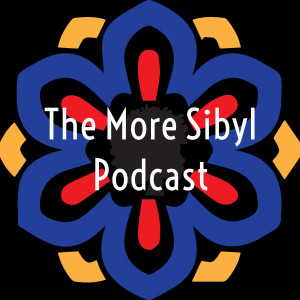
Friday Dec 21, 2018
우리 사랑스러운 엄마| The One with Mom - The Life of Mo{m}: Episode 44 (2018)
Friday Dec 21, 2018
Friday Dec 21, 2018
In Episode 45 – The One with Zainab, Zainab and I talked about the song – Wear Sunscreen by Baz Luhrmann and what this song means to us. A line in that song “Get to know your parents, you never know when they'll be gone for good,” inspired this episode with mom.
Like most families, mine isn’t without its secrets. Growing up, I had a hunch that my family was different, in terms of its origin. For starters, there were no wedding pictures (my parents legally got married eight years after I was born) and I thought my parents’ lives were interrupted. So what was the big secret?
Country bumpkin girl moves to the city with big dreams and bumps into city boy. Boy falls head over heels in love with girl. On one stormy night of passion, one thing led to another; girl *fell pregnant and yours truly was conceived. Girl gets kicked out of the house and begins life, which became the life of mom. Sounds like an R-rated Korean Drama, right?!
This episode is really about getting to know that girl before she became mom and also an opportunity to give words to her fear. While, it’s a story about mom, her sacrifices, and the sheer strength of this woman I am blessed to call my mom, it’s also one about setting our stories free.
So, here’s me hoping you get to know your parents before they became mom and dad. You might just be surprised as to what you may find. I hope you let me know how it goes.
PS: You also get to hear one of my own struggles in this episode.
*Refer to The Linda Ikeji Dictionary, version 18.5
Recommended songs:
“When You Learn To Sing” – Rocco De Luca (2009)
Very Respectfully,
모 /Mo!/
--- Support this podcast: https://anchor.fm/mosibyl/support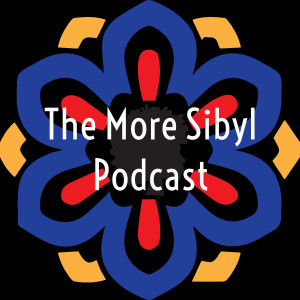
Friday Dec 21, 2018
Friday Dec 21, 2018
Here’s a joke for you:
Two Ghanaians and a Nigerian walk into a bar… but left because they didn’t have Nigerian jollof rice.
Ghana, a relatively unknown place until Nigeria shot them into popularity (ugh, the things we do for them!). Also, Ghana, the place filled with people of mystery, strange English diction, low production movies, and weird jollof rice concoction. In a bid to explore this enigmatic country, I invited two Ghanaians over to my house over a meal of Indo-Thai goat curry, Korean steamed rice, and mixed vegetables (all made by yours truly). We explored salient issues like jollof rice (of course! And why Ghanaians cannot get this right), pet peeves (turned out I am more finicky than I thought, ugh), acculturation problems, adjusting to the educational system, books, what traits determine success in grad school, racial identity, questions about my marriage, and so much more.
PS: One of the guests – Elias – took me on my offer to cook any meal of choice for anyone who was visiting Oklahoma and wanted to stop by my house – this is still an open invitation to anyone BTW. Living in America, the off-and-on Ghana-Nigeria banter never ceases. In fact, we unite more as Africans against common causes like acculturation, socialization, and just everything else American. So I guess this is the story about three Africans who are trying to hack it in America.
We Ghana be alright,
모 /Mo!/
--- Support this podcast: https://anchor.fm/mosibyl/support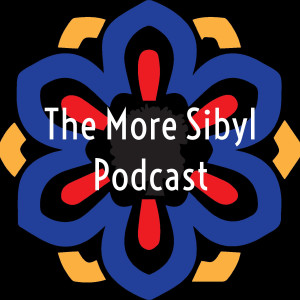
Friday Dec 21, 2018
Friday Dec 21, 2018
Meet Zainab – single mom, graduate student, and special-ed enthusiast! She hails from the Hausa tribe in the Northern part of Nigeria. Zainab has faced some adversities in her life as a domestic violence survivor and divorcee, but she’s turned that all around to pursue her dreams. She is currently pursuing a Ph.D. degree in Special Education at The University of Texas at Austin, majoring in learning disabilities and behavioral disorders.
She plans to go back to Nigeria to establish a world-class school in rural areas and provide free and subsidized education to children, especially those with special needs, who will otherwise not have access to education.
I met Zainab on an online forum, and we became fast friends. In this episode, we talked about her life story, why Northerners don’t migrate to the US, her dreams for her daughter, and why we all need to wear sunscreen, and so much more. Also, find out one thing Zainab does well, that shook me as a Yoruba girl.
Perhaps, the most central thing about this episode is the merit of educating the girl-child and providing her with equal opportunities to change the world around her. Also, remember to seek help if you are in an abusive relationship. Abuse is not OK!
PPS: Hausas was used interchangeably to refer to those from Northern Nigeria. Please note that this is an overgeneralization.
Recommended song:
“Wear Sunscreen” – Baz Luhrmann (1999)
Trust me on that sunscreen; wear them,
모 /Mo!/
--- Support this podcast: https://anchor.fm/mosibyl/support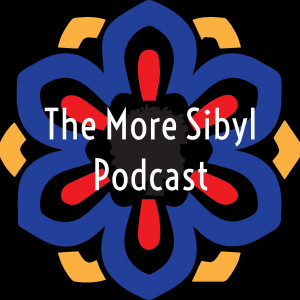
Friday Dec 21, 2018
Friday Dec 21, 2018
As this is a show for Blacks, Asians, and those who love them, what better way to solidify that message than with this week’s guest – Teresa Nhi Nguyen. Nhi is pronounced /ɲi/ and Nguyen /ŋwɪn/. Teresa is a freelance graphic/web designer based in Austin, who hopes to create work that can serve to communicate beautiful messages, inspire others, and change the world. In her free time, she dabbles in HTML/CSS, goes on food adventures, and learn new skills to add to her arsenal. You can learn more about Teresa and her work here: http://nhibnguyen.com/.
In this episode, we talked about what being Vietnamese-American means to her and the gentrification of the Asian culture via food and clothing. We also explored career switch, fear of failing, and managing parental expectations.
Perhaps, the most central thing about this episode is how our dreams can shape our world and that of the people around us – from Teresa’s father’s dream of fleeing communist Vietnam (way back then) to start afresh in the US, to Teresa’s dream of changing the world around her through her eyes and talents.
About Teresa:
She’s really versatile and comes highly recommended. She is the brains behind the More Sibyl website as she designed it. She also curates logos. So, you got design and branding needs? Hit Teresa up; mention the show to get a discount.
Before design became a passion, she was on her way to optometry school. Find out more by listening.
Takeaway Points:
- Parents, especially African and Asian ones, are alike in many ways.
- To appreciate and honor other cultures, learn more about its underpinnings and why things are the way they are. Don’t take parts of a culture, relabel it and tag it ‘authentic.’
- Cultivate your hobbies because they may someday become your passion and lifework.
Mo! says:
“Try everything twice – once for the novelty and second time to see if you really like it.”
Pho-bulously yours,
모 /Mo!/
--- Support this podcast: https://anchor.fm/mosibyl/support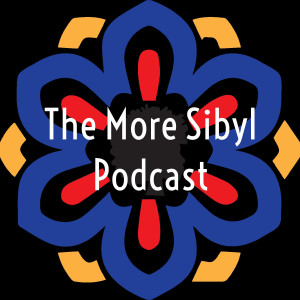
Friday Dec 21, 2018
Friday Dec 21, 2018
Meet Rev. David Esosa Ize-Iyamu, one of the more than 30 Nigerian presidential candidates running in the 2019 election. On a warm, humid Friday evening, just before I was scheduled to catch my flight out of Nigeria, I sat with him in his office to talk about his platform, why he is running, and what he hopes to achieve if given the opportunity to become the next president of Nigeria.
Rev. Ize-Iyamu is the senior pastor of Jesus Evangelical Assembly in Lagos. For more than 20 years, his platform – the Youth Revolution Movement (YRM) has aimed to mobilize youths to play a decisive role in the national socio-economic development and to see empowered Nigerian youths fully realize their potentials and positively contribute to the overall growth, development, and governance of Nigeria.
According to Rev Ize-Iyamu:
Here are the things we need to look for in a presidential candidate: courage, strong nationalistic interest, and integrity.
A lot of credible Nigerians have stayed away from politics. They have focused on different fields and have excelled. As a result, the political terrain and governance realm have been left in the hands of a lot of incompetent, unpatriotic set of Nigerians. And that is why we have the kind of system we have today.
How do we then change this narrative?
- Look out for a new breed of Nigerians who are patriotic with burning national interests, be given the competence to lead at every key level of governance. A new team of competent levels can spark off an overwhelming change in the entire governance of the nation.
- Remember to exercise your civic duty by voting and doing so wisely.
God Bless Nigeria,
모 /Mo!/
--- Support this podcast: https://anchor.fm/mosibyl/support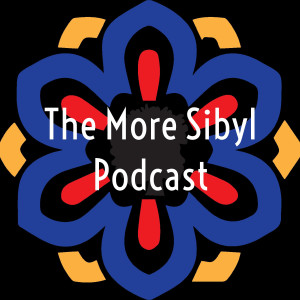
Friday Dec 21, 2018
Friday Dec 21, 2018
Here’s re-introducing, Yvonne Edo-Olotu. She is a lawyer during the day and a content creator at night/weekends. She is the brains behind the Beautiful Mind Podcast; you can find that show on iTunes/SoundCloud/Stitcher. We met when I worked in Ibadan (a Southwestern city in Nigeria) several years ago. She got her LL.M at Cornell University and recently returned to Nigeria.
In this episode, we took a drive to memory lane to explore our differing personalities and how this defines our friendship; our love-hate relationship with Korean dramas and favorite shows; and why we, as women, need fewer mentors and other kinds of key players to advance our careers and grow personally and professionally.
We also talked about adjustments she had to make when she moved back from the US and how she builds social support in a city as boisterous and crazy as Lagos!
Tips from Mo!:
Never trust a person who kisses with their eyes open.
About our friendship:
- She is introvertish and I try to be sometimes (haha).
- We bonded initially over the song - 99 Red balloons by Nena.
- She is an avid reader as well.
- She is a podcaster too; check out Yvonne’s podcast: https://soundcloud.com/beautifulmindpodcast
Recommended song:
“Free Fallin’” – John Mayer (Matoma & Nelsaan Tropical Mojito Remix) (2014)
Best,
모 /Mo!/
--- Support this podcast: https://anchor.fm/mosibyl/support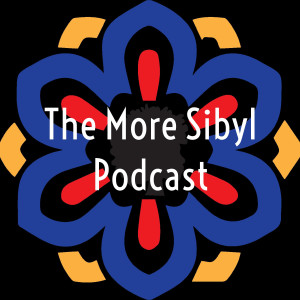
Friday Dec 21, 2018
Friday Dec 21, 2018
Today’s guest on the show is very dear to my heart and has been a source of support and an oasis of wisdom, especially during some rough patches I experienced in my first few years in the US. Dr. Nnabuchi Anikpezie or 'Buchi (as I like to call him) is another Nigerian in diaspora trying to make a home in his new environment.
Though he trained and worked as a physician before moving to the US, he currently works in healthcare administration as an analyst. His work does not define him, rather it is his Rotary affiliation that he credits for much of his experience and culture. 'Buchi has been part of Rotary for almost twenty years. He is the immediate past president of Rotary eClub One. 'Buchi lives with his family in the Houston metro area.
In this episode, we explored his childhood dreams, why he studied medicine, his decision to switch career trajectories, considering he took a different route than most of his counterparts who end up writing the USMLE and practicing in the US. We also talked about home, our constant search for it, and the sad realization of what we find at the end of it all. Also, on how his accidental stumble into fatherhood changed his life and sharpened his focus.
PS: I really loved taping this episode with Buchi, especially as he talked about his regrets and why he would not change any of those. Here’s a special shout-out to the Bro. Emmas out there: siblings parenting and raising their siblings. Thank you for all you do!
Support the show:
Buchi has a full-concierge travel agency. If you book a flight or hotel through his website, you get a discount, and I do too. By using the code – “MOSIBYL”, you get:
- A $10 discount (minimum booking of two nights) on hotels.
- $30 off flights (international flights only and does not apply to promo fares).
- Check out his page here: www.bcatravels.com
Episode Nuggets:
- “Life is what happens to you while you're busy making other plans.” – Allen Saunders.
- Sometimes, we come to certain decisions or pathways for different reasons. Once we make that decision, we have to own that decision and live it.
- Don’t dwell on your regrets, no matter how mighty they were.
Recommended song:
“Ojigi” – Phyno (2014)
